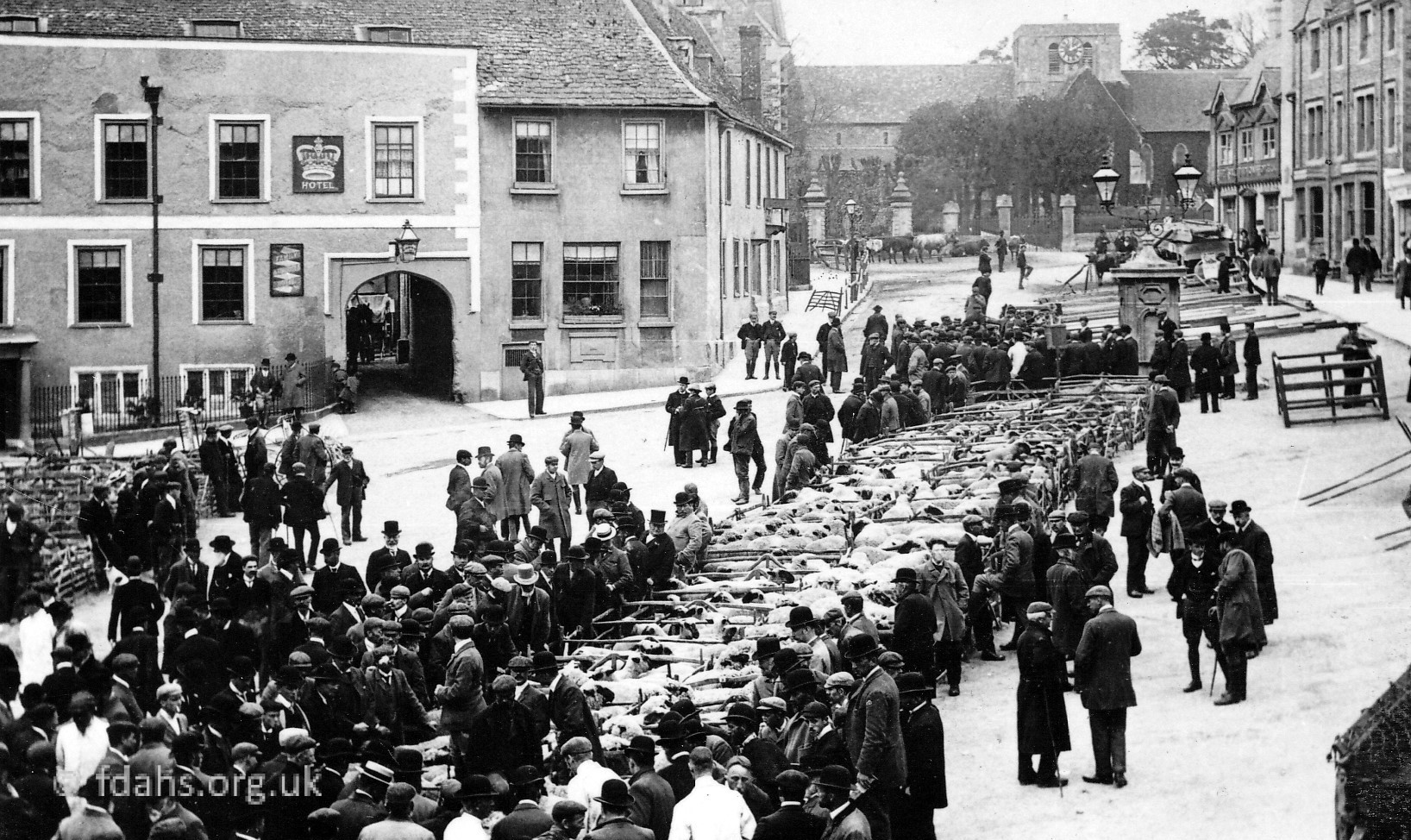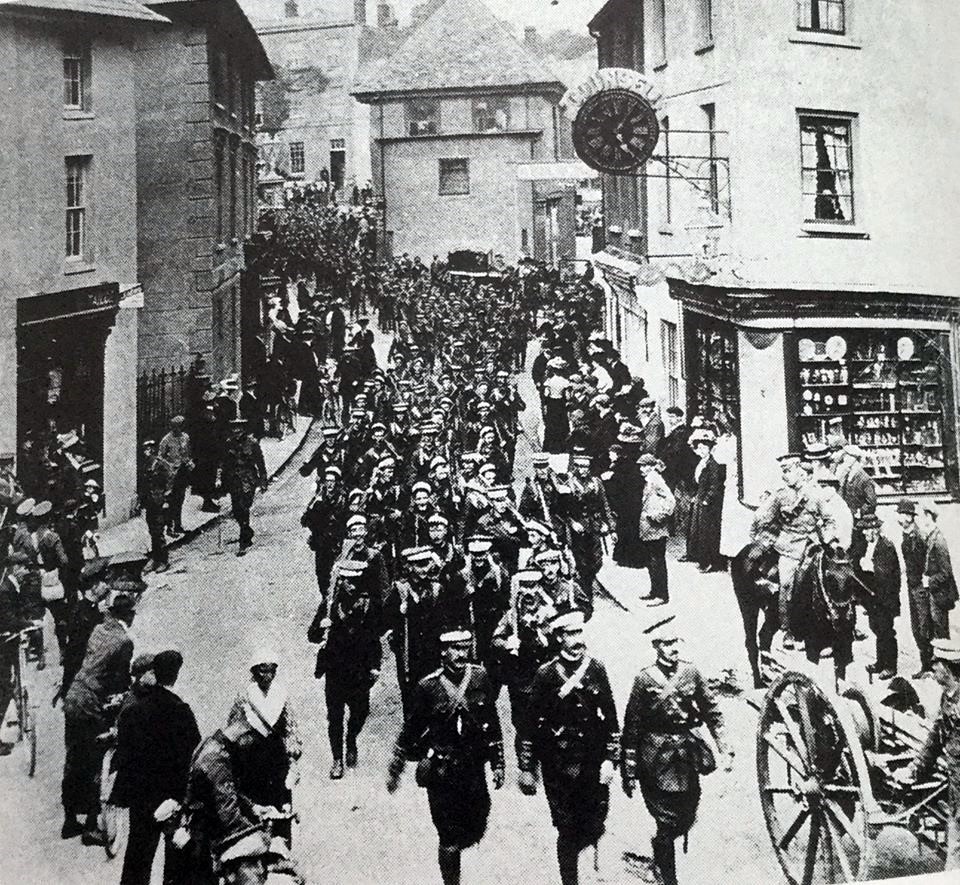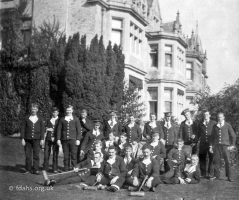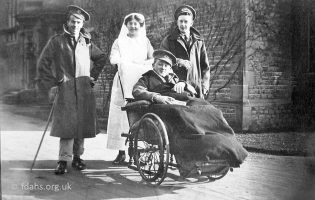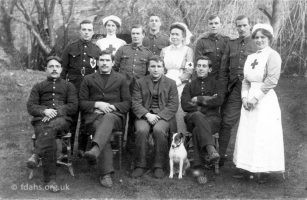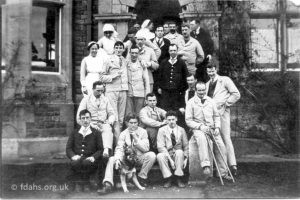Pre-War Manoeuvres
1911. Army manoeuvres through Faringdon. The troops were en route from the feeding station at Church Path farm. There was an enlisting station based in the Bull Inn on London Street. They would receive 5/- for every man they enlisted, and as beer was only 2d a pint, they considered it a good bargain to spend up to 2/6 per man in their efforts to persuade men to enlist. The men were known as ‘Volunteers’ and they paraded through the town quite regularly. They were all keen riflemen and had their targets in a field at the end of Southampton Street, firing at these from the butts at the foot of Jasper’s Hill. Hence the naming of Butts Road, Butts Close and Volunteer Way.
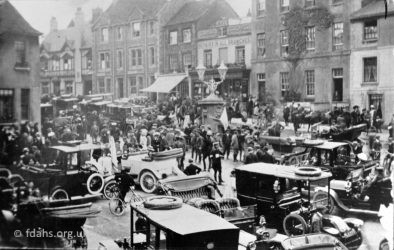 1911. An early traffic jam in the Market Place. Lots of London taxis, those with a spare tyre on the roof, had brought many foreign military attaches to Faringdon to observe military manoeuvres taking place near the town. The Prime Minister, Mr Asquith, accompanied by the Duke of Connaught (his car is the white one in this photo) and many others, watched the proceedings.
1911. An early traffic jam in the Market Place. Lots of London taxis, those with a spare tyre on the roof, had brought many foreign military attaches to Faringdon to observe military manoeuvres taking place near the town. The Prime Minister, Mr Asquith, accompanied by the Duke of Connaught (his car is the white one in this photo) and many others, watched the proceedings.
As well as all these important people descending on the town, this event must have been quite a shock for the population of Faringdon when you consider that motor vehicles were only just becoming widely available and then only for the more wealthy classes, so very few had ever been seen on our streets before.
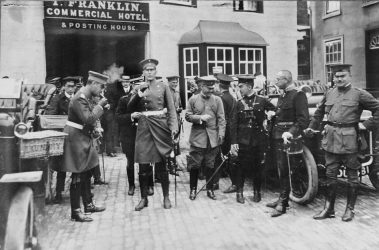 1909. Military officers from different nations emerging from the Bell. The tall German officer is Crown Prince Wilhelm of Germany, the son of Kaiser Wilhelm II.
1909. Military officers from different nations emerging from the Bell. The tall German officer is Crown Prince Wilhelm of Germany, the son of Kaiser Wilhelm II.
Taken from an article in the 1996 August edition of the Faringdon Folly 3 – “It is September 1909, and there were large scale manoeuvres in this area. The photo is of some of the foreign military attaches and observers who descended upon Faringdon to watch the Red and Blue armies fight the battle for Faringdon. This took place on the slope of the Folly Hill, overlooking Wadley. Emerging from the Bell Hotel and caught by a Daily Mirror photographer is the German Kaiser’s son Wilhelm, later christened by the British troops ‘Little Willie’. He stood well over six feet tall, and had a withered right hand over which he always wore a leather glove – but, as our photo shows, he could still hold a fat cigar. The man on his right is wearing an identical uniform to Willie, and also likes a smoke, so I assume he is one of the German party. The second man from the right with the gooseberry haircut and his hand on his sword looks every inch the typical Prussian military man; he is wearing some strange riding boot with large flaps over the insteps, but is not wearing earmuffs. that is just a mark on the photo! The two officers enjoying a joke next to him are most probably some of the Japanese invited over by the War Office. There is also a French style Kepi in front of the window, the wearer of which is sitting in the back of the big car. Motor cars were fairly common in 1909, but the military mind was still focused on the horse. All the military men are wearing riding boots, and all appear to have spurs. The sword attachments are designed for horseback use with longer straps. Ceremonial sword dress does not let them drag along the ground quite so much.”
Battle Of The Empires
 Britain declared war on Germany on the 4th August 1914, when Germany attacked France through Belgium. Germany, once a number of independent sovereign states had joined together as one country, and now formed an alliance with the adjacent Austro-Hungarian Empire and the Ottoman Empire to the east. They then decided to take over the rest of Europe, and also invade the Russian Empire, who were already at war with Japan. And so the nastiest ever battle of the empires had begun. The world was full of empires at this time, the British Empire, by far the largest, covered around 25% of the world’s land surface.
Britain declared war on Germany on the 4th August 1914, when Germany attacked France through Belgium. Germany, once a number of independent sovereign states had joined together as one country, and now formed an alliance with the adjacent Austro-Hungarian Empire and the Ottoman Empire to the east. They then decided to take over the rest of Europe, and also invade the Russian Empire, who were already at war with Japan. And so the nastiest ever battle of the empires had begun. The world was full of empires at this time, the British Empire, by far the largest, covered around 25% of the world’s land surface.
At the beginning, the young men of Britain were asked to volunteer for service in the armed forces but so many thousands were slaughtered in battle that by January 1916 conscription had to be made compulsory. Villages and towns all over Britain lost many of their young men; a lot were never identified and listed as missing in action – Faringdon War Memorial.
THE CALL TO ARMS
One hundred thousand more men
Is the call that sounds to-day ;
The call is urgent, all must know,
Come, enlist without delay.
One hundred thousand more men
Who do little else but play,
Are asked (not made) to forward come
And enlist without delay.
One hundred thousand more men
Who’re inclined at home to stay,
Should now come forth, as others have,
And enlist without delay.
One hundred thousand more men,
Still to keep our foe at bay,
Is now our country’s greatest need,
So enlist without delay.
One hundred thousand more men
Should be found with ease, they say;
Come, then, and show you’re Britons true,
And enlist without delay.
One hundred thousand more men
Who’d not see our fame decay,
Must know how very much it means
To enlist without delay.
One hundred thousand more men!
Think of those now far away,
How they left all, at duty’s call,
Enlisting without delay.
G. PIGGOTT, West Challow. (Faringdon Advertiser 7 November 1914)
Killed In Action
The following is one of many announcements appearing in the local papers at the time – Mr Samuel Ford, of Southampton Street, Faringdon, has received official notification that his son, Pvt. Arthur Ford, aged 26, was killed in action in France on September 29th. He joined the 1st Batt. King’s Company Grenadier Guards in September 1914, and had been serving in France for about 18 months. He had for some time been acting as stretcher bearer with his regiment, and in a letter written to his father and sister on the 19th September he said that he had been buried by a shell but had got out all right. Much sympathy is felt with Mr Ford and family in their bereavement. Faringdon Advertiser 14 October 1916
Letters From The Front
Around the turn of the century, school attendance was made compulsory for children and one historical consequence of this was that the common masses were now able to read and write, a privilege previously confined to the more wealthy. So for the first time in history, most soldiers were able to write letters home from the battle field. The following extract in the Faringdon Advertiser 5 December 1914 is from a letter to a friend written by a Faringdon lad serving with the Royal Berks Regiment, who was with his Regiment in India when the war broke out:
Expeditionary Force, 24/11/1914. “Just a line or two to let you know that I am quite well and in the best of health. I cannot let you know where I am as it is forbidden to put either address or place of abode, but the latter is the trenches. I am able to say that at present all the Faringdon boys in our Regiment are quite well. We get some cigarettes, tobacco, and a few matches given us every three days; we also get plenty of food. The weather is rather cold, but dry, which is better than rain on these turn outs. I get a good deal of news from home, so don’t think that we don’t get a paper. I get the Advertiser when the letters come. The people here are very good what few there are. Only the [– line of text unreadable– ] having a rest, a family came and had a look at their old home; it was standing, and that’s all. The poor woman cried with grief. Just fancy our old home with not a person left in it, the old Church shattered to pieces, nearly all the houses with only the chimney left, the cattle and fowls running about with no one to look after them. Then they are asking for more men. The young men at home don’t realise what it would be like if the Germans did get to England, and I think it is their duty to help stop them. I stayed in a billet on the way here, and we fared well. The only thing about it is the people don’t know what tea is; they only seem drink coffee, which, however, is very good. Will write again when I have a few minutes to spare, that is if the German ‘Black Marias’ or ‘Jack Johnsons’ as we call them, don’t come and put us out of mess, but a lot of their shells are like bags of lard, they lie where they fall and don’t burst; when they do they make a hole about 12 feet in diameter and 3 feet deep – not so bad, is it? They try to blow up our Artillery with these.”
Faringdon Red Cross Hospital
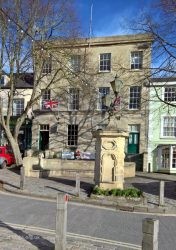 In August 1914, Sir Alexander Henderson (1st Lord Faringdon) offered the Pump House in the Market Place to be used as a hospital for the wounded. The hospital was prepared and equipped by the Faringdon Branch of the British Red Cross Association. The resident Matron, Miss Fenton, was in sole charge, and the Red Cross nurses were on duty in relays of two, whilst the ambulance men attached to the Faringdon Branch of the British Red Cross Society acted as orderlies. Everything was done to ensure the care and comfort of the patients. On the ground floor was the kitchen, the men’s reading room and two reception rooms. On the first floor were 12 beds for patients; on the second floor were a bathroom and offices; and on the third floor were four beds for patients, the Matron’s bedroom, the maid’s bedroom and the Red Cross Nurses’ bedroom. Hot and cold water was also laid on. Food and clothing was donated by the local people, among them being local business men and by collections in church.
In August 1914, Sir Alexander Henderson (1st Lord Faringdon) offered the Pump House in the Market Place to be used as a hospital for the wounded. The hospital was prepared and equipped by the Faringdon Branch of the British Red Cross Association. The resident Matron, Miss Fenton, was in sole charge, and the Red Cross nurses were on duty in relays of two, whilst the ambulance men attached to the Faringdon Branch of the British Red Cross Society acted as orderlies. Everything was done to ensure the care and comfort of the patients. On the ground floor was the kitchen, the men’s reading room and two reception rooms. On the first floor were 12 beds for patients; on the second floor were a bathroom and offices; and on the third floor were four beds for patients, the Matron’s bedroom, the maid’s bedroom and the Red Cross Nurses’ bedroom. Hot and cold water was also laid on. Food and clothing was donated by the local people, among them being local business men and by collections in church.
The first patients to arrive were 11 wounded soldiers – 4 Belgian and 7 English. The Englishmen included two from our own neighbourhood: Pte W. Wheeler, 1st Royal Berks (Uffington); and Pte A. Harris, 4th Royal Berks (East Lockinge). Another, Lance Corporal Hammond, of the 1st Berks Regiment, arrived the following week. He was living and working in Faringdon as a jobbing gardener. but at the outbreak of war he was a reservist, he had no disease or wound, but was suffering from shock caused by the explosion of a shell while in the trenches.
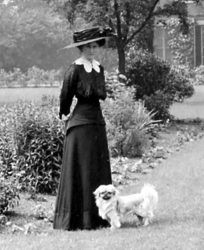
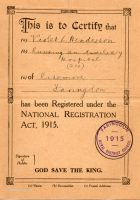 Alexander’s eldest son Harold Greenwood Henderson (1875-1922) and his wife Lady Violet Charlotte Henderson (1879-1956) lived at Kitemore House, near Shellingford. Lady Henderson was a registered nurse and had cared for her husband, brother, father and uncle, who had been wounded in the Boer War (1899-1902). So when the hospital in the Pump House outgrew itself within only a few months, it was transferred to Lady Henderson’s home. She and four nurses cared for over 242 wounded ‘inmates’ over the next 11 months.
Alexander’s eldest son Harold Greenwood Henderson (1875-1922) and his wife Lady Violet Charlotte Henderson (1879-1956) lived at Kitemore House, near Shellingford. Lady Henderson was a registered nurse and had cared for her husband, brother, father and uncle, who had been wounded in the Boer War (1899-1902). So when the hospital in the Pump House outgrew itself within only a few months, it was transferred to Lady Henderson’s home. She and four nurses cared for over 242 wounded ‘inmates’ over the next 11 months.
Aeroplane In Trouble
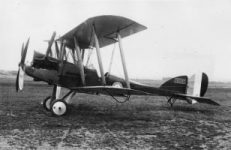 A member of the Royal Flying Corps, whilst on a journey from Bristol to Oxford on Saturday last, experienced engine trouble on nearing Faringdon, and decided to land. This he effected in a field near Ashen Copse Farm, but smashed the wheels of the machine in so doing. Assistance was wired for and a break-down gang arrived from Chiseldon, but the necessary repairs were not completed until Sunday afternoon. The airman then took his seat and flew around for some minutes, in the course of which one of the wheels came off, and in landing a few fields away the machine was again damaged. This necessitated staying over another night, and it was nearly middle day on Monday before the airman was able to take his departure. The whereabouts of the machine soon spread abroad, and hundreds of people from Faringdon, Highworth, and the surrounding villages witnessed the proceedings on Sunday, it being the first time that many of them had seen a flying machine at close quarters. The airman, during his stay, was kindly entertained by the Hon. Mrs D. Pleydell Bouverie at Coleshill House.2 Faringdon Advertiser 30 September 1916 (not actual photo).
A member of the Royal Flying Corps, whilst on a journey from Bristol to Oxford on Saturday last, experienced engine trouble on nearing Faringdon, and decided to land. This he effected in a field near Ashen Copse Farm, but smashed the wheels of the machine in so doing. Assistance was wired for and a break-down gang arrived from Chiseldon, but the necessary repairs were not completed until Sunday afternoon. The airman then took his seat and flew around for some minutes, in the course of which one of the wheels came off, and in landing a few fields away the machine was again damaged. This necessitated staying over another night, and it was nearly middle day on Monday before the airman was able to take his departure. The whereabouts of the machine soon spread abroad, and hundreds of people from Faringdon, Highworth, and the surrounding villages witnessed the proceedings on Sunday, it being the first time that many of them had seen a flying machine at close quarters. The airman, during his stay, was kindly entertained by the Hon. Mrs D. Pleydell Bouverie at Coleshill House.2 Faringdon Advertiser 30 September 1916 (not actual photo).
Refugees
At the start of the war in Europe about 250,000 Belgian refugees came to Britain to escape the virtual demolition of their country. Many local towns offered hospitality to the families. Relief funds were set up and events organised to raise funds. A sale of “Belgian Favours” was held in Faringdon on market day Tuesday 3rd November and raised £8 5s 0d, equivalent to about £90 today. Lechlade had a town collection and raised a somewhat better £54. The following other reports appeared in the local paper throughout the month, along side the all too frequent “Killed in Action” and endless “Casualties” notices. Three refugee families were settled in Burford, a 15 year old son of one family attended the grammar school, another son had been left behind in the Belgian Army. Over 50 refugees arrived in Witney. A family of four was housed in a cottage at Lechlade Manor. Seven refugees were given the use of a cottage in Bourton.
Rationing
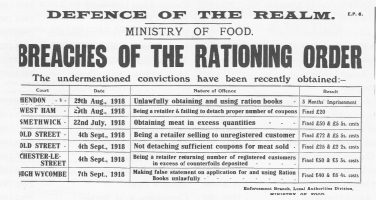 Breaches of the Rationing Order by people who misused their ration books during the 1914-18 War were severely punished, as can be seen from this notice.
Breaches of the Rationing Order by people who misused their ration books during the 1914-18 War were severely punished, as can be seen from this notice.
A![]() list of soldiers, sailors & airmen from Faringdon and surrounding villages 1914-18 including national reserve, railway guards and men applying for exemption. Compiled by Rosemary Church from the Faringdon Advertiser 2010: Soldiers, Sailors & Airmen 1914-18
list of soldiers, sailors & airmen from Faringdon and surrounding villages 1914-18 including national reserve, railway guards and men applying for exemption. Compiled by Rosemary Church from the Faringdon Advertiser 2010: Soldiers, Sailors & Airmen 1914-18
References:
- The Changing Faces of Faringdon and Surrounding Villages – Bk2 p40. By Rosemary Church, Jim Brown, Millie Bryan and Beryl Newman. Robert Boyd Publications.
- Faringdon Advertiser 22nd August 1914, 5 December 1914, 30 September 1916.
- Faringdon Folly, August 1996. Nostalgia Corner article written by Jim Brown.
Researched and compiled by Ian Lee, November 2020.
